World

Indian Supreme Court to reconsider the nation’s ban on gay sex
The Supreme Court of India announced Monday that it would reconsider its 2013 ruling upholding Section 377, a colonial-era law criminalizing same-sex sexual relations. A promising sign, the Court also asked the government to respond to a petition from five LGBTQ people who said they live in fear of police because of their identities.
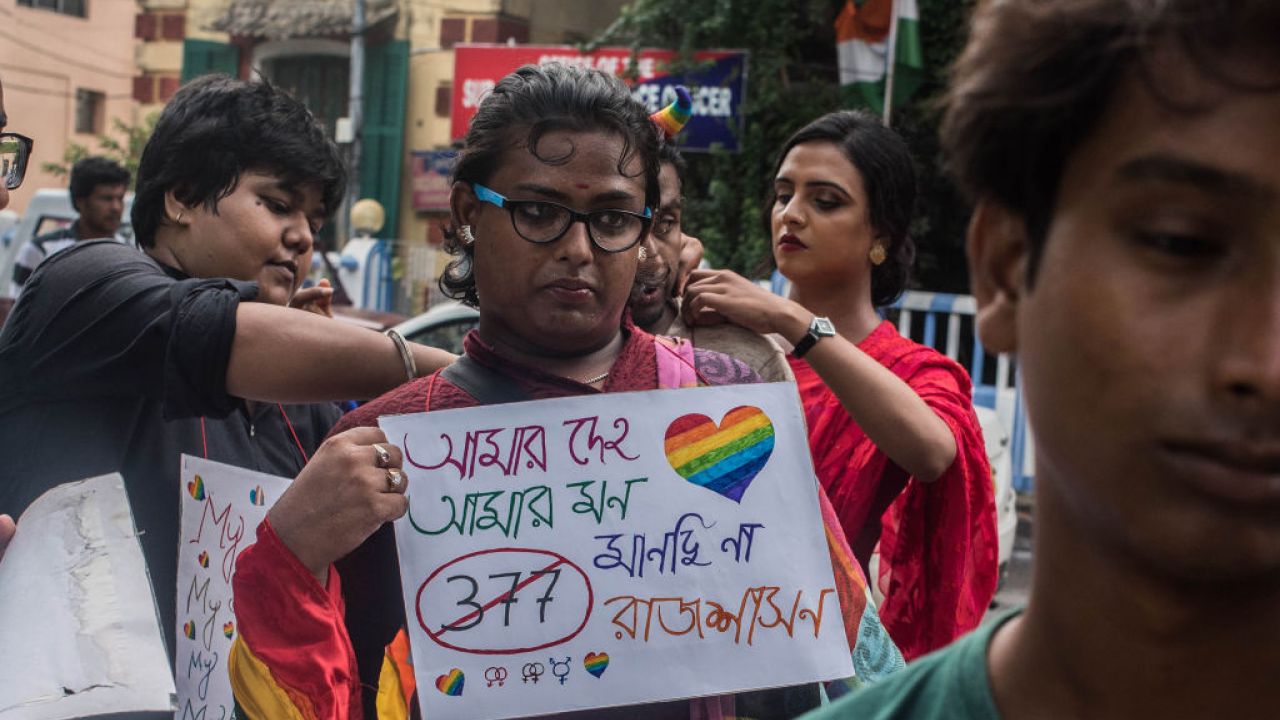
A protest against Section 377 in July, 2017. Getty Images
Section 377 prohibits “carnal intercourse against the order of nature with any man, woman, or animal,” but the Court explained Monday, “What is natural to one may not be natural to others,” adding, “A section of people or individuals who exercise their choice should never remain in a state of fear.”
In 2009, the High Court of Delhi ruled against the law, but in 2013, the Supreme Court set aside that ruling, keeping the law in place. In addition to the advocacy and discussion that followed that setback, subsequent rulings in favor of transgender equality and, most recently, establishing privacy as a fundamental right have help set the stage for the Court to revisit the law.
Section 377 dates back to 1860 when Britain ruled India as a colony and comes with a punishment of up to 10 years in jail. For more than half the countries in the world that have such a sodomy law, British colonialism was the origin, and almost 70 percent of those British sodomy laws are still in effect. Prior to colonial imposition of Christian sexual values, India had a long history of culturally embracing the transgression of gender norms.
The law is not commonly enforced, but it is used to harass and blackmail gay people, who then cannot report the blackmail because they fear persecution under the law.

Rising tensions; U.S. places Pakistan on watch list for religious freedom violations
The U.S. State Department has placed Pakistan on a special watch list for “severe violations of religious freedom,” it said on Thursday, days after the White House said Islamabad would have to do more to combat terrorism to receive U.S. aid.
The State Department also said it had re-designated 10 other nations as “countries of particular concern” under the International Religious Freedom Act for having engaged in or tolerated egregious violations of religious freedom.
The re-designated countries were China, Eritrea, Iran, Myanmar, North Korea, Sudan, Saudi Arabia, Tajikistan, Turkmenistan and Uzbekistan. They were re-designated on Dec. 22.
“The protection of religious freedom is vital to peace, stability, and prosperity,” the department said in a statement. “These designations are aimed at improving the respect for religious freedom in these countries.”
U.S. President Donald Trump has criticized Pakistan for not doing more to combat terrorism, and his administration has informed members of Congress that it will announce plans to end “security assistance” payments to the country.
Pakistan has said it is already doing a lot to fight militants, and summoned the U.S. ambassador to explain a tweet by Trump that said the United States had been foolish in dispensing aid to Islamabad.
(Reuters)

Russia 'simulated full-scale war' against Nato, says military commander
Russian war games held last September “simulated a large-scale military attack against Nato“, the commander of the Estonian Defence Forces has claimed.
Riho Terras confirmed Nato’s fears that the Zapad (or “West”) exercises were used to simulate a conflict with the US-led alliance and show off Russia’s ability to amass large numbers of troops at extremely short notice in the event of a conflict.
The drills – which were held in Belarus, the Baltic Sea, western Russia and its Kaliningrad outpost between 14 and 20 September last year – depicted a fictional scenario concerned with attacks by militants, according to Russia’s defence ministry.
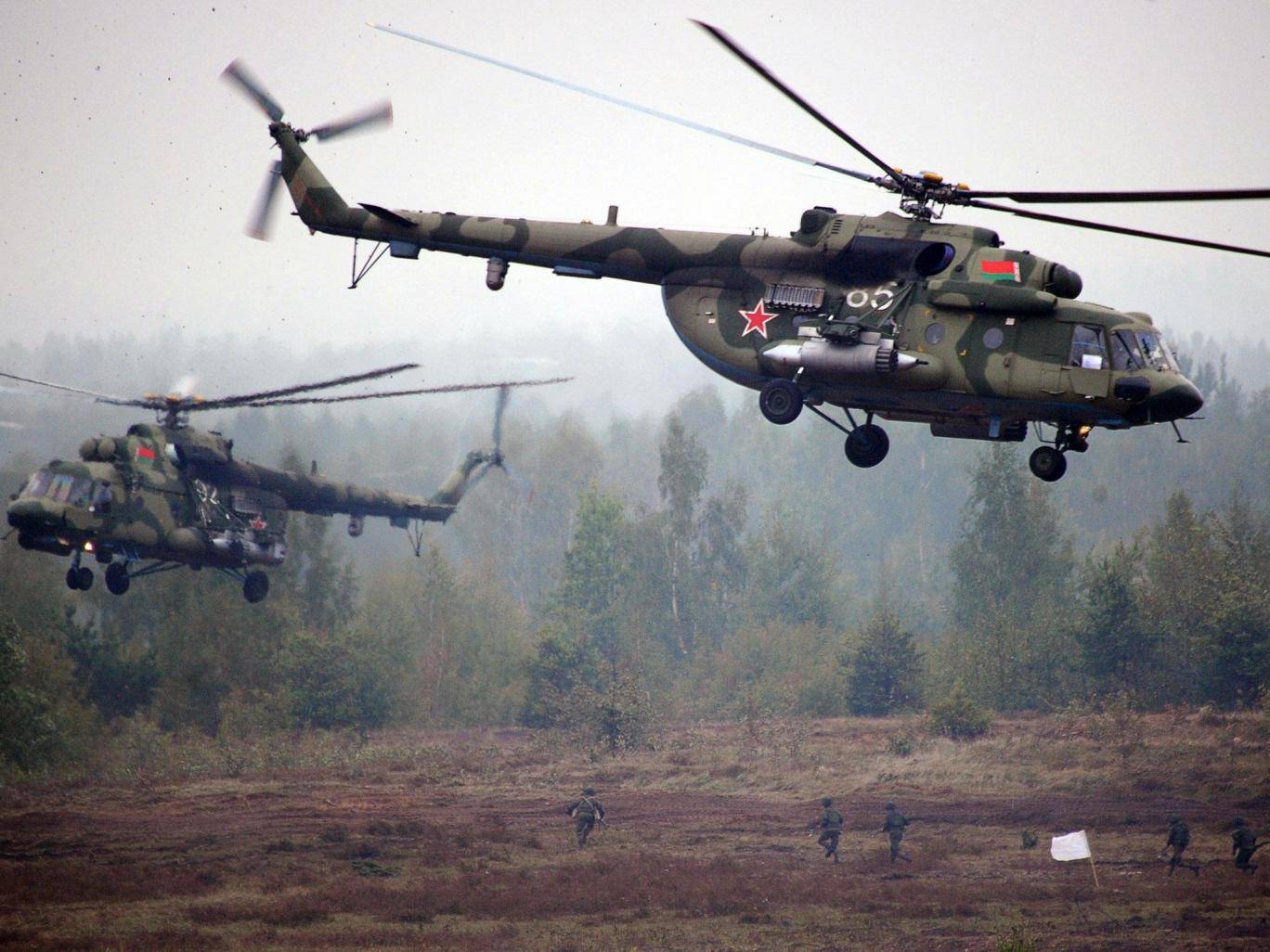
The Zapad exercises showed Russia’s ability to amass large numbers of troops at extremely short notice AFP/Getty
But in an interview with Germany’s top-selling newspaper, Bild, Mr Terras said: “Let me be clear: with the exercise Zapad 2017, Russia simulated a large-scale military attack against Nato.
“It was not targeted towards the Baltic states only, as it was a theatre-wide series of exercises spanning from high North to the Black Sea.”
He added: “The scale and extent of the entire exercise was far greater than officially stated.”
Instead of being a “purely defensive” exercise, as Russia claimed, Zapad was used to simulate a “full-scale conventional war against Nato in Europe”, the newspaper previously reported, citing two analysts from a western intelligence service.
The report claimed the drills involved far more troops than the 12,700 that Russia’s defence ministry claimed took part.
Another 12,000 Russian soldiers took part in exercises in regions “near the Estonian borders”, and more than 10,000 in the area near the north of Finland and Norway, the sources said.
(The Independent)
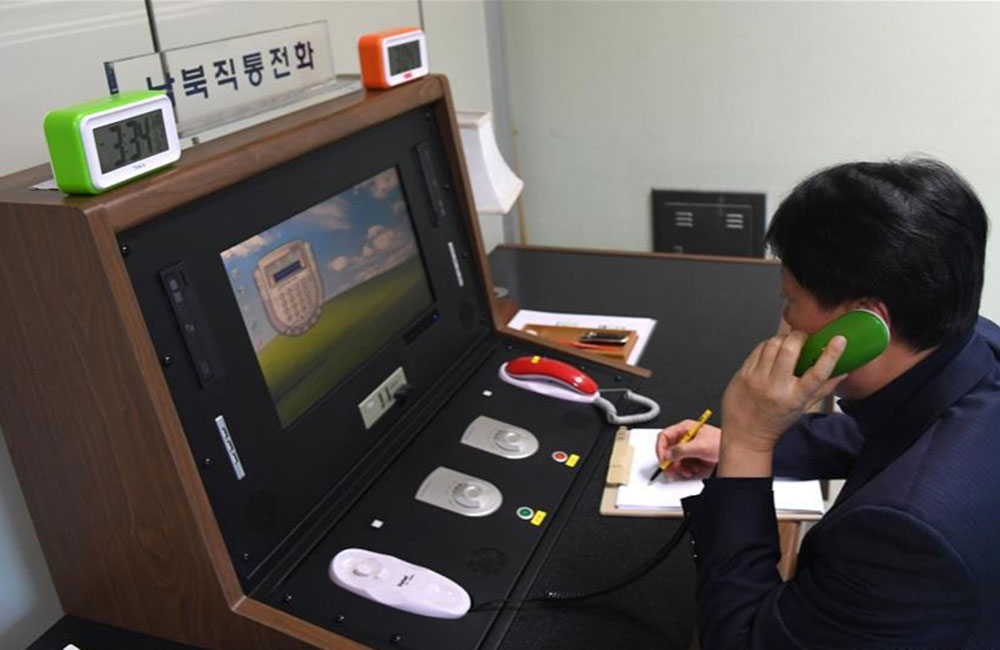
North Korea reopens hotline to South to discuss Olympics
North Korea has reopened a hotline to South Korea, almost two years after it was disabled on the orders of leader Kim Jong-un.
South Korea confirmed it had received a call from the North at 15:30 local time (06:30 GMT) on Wednesday.
The North Korean leader had earlier said he was open to dialogue with Seoul and to sending a team to the Winter Olympics in the South next month.
The two nations have not held high-level talks since December 2015.
North Korea cut off the communications channel shortly afterwards, refusing to answer calls, according to officials in the South.
A North Korean official announced the hotline's reopening in a televised statement.
Instead of a senior newscaster, the chairman of the Committee for the Peaceful Reunification of the Fatherland, Ri Son-gwon, made the statement, saying he was speaking "upon authorisation of Kim Jong-un".
The initial call was brief as checks are still being carried out on the line, according to South Korean officials.
North Korea said the aim would be for the two nations to discuss the practical issues around sending a North Korean delegation to the Winter Games in Pyeongchang.
How has the South responded?
The press secretary for South Korea's President Moon Jae-in said the restoration of this communications channel was "very significant".
"It creates an environment where communication will be possible at all times," he said.
In the press, there was scepticism. "Kim's New Year's address is a highly calculated move to fuel internal division in South Korea," said daily newspaper JoongAng Ilbo. "Pyongyang may have decided on its peace offensive to buy time until the completion of its nuclear weapons programme."
Hankyoreh newspaper also voiced caution: "Kim has not budged an inch from his previous reckless and hard-line stance on the development of nuclear weapons and missiles."
But the "surprising New Year's address could open the door to peace", it added.
Where is the physical line?
According to the South Korean Unification Ministry, there are a total of 33 direct lines that North and South Korea once used to communicate with each other.
This particular phone line, established in 1971, is based in Panmunjom.
The border village, in the heavily guarded demilitarised zone (DMZ), is where the Koreas have historically held talks.
Source : BBC

President steps in over Islamophobic abuse of Austria's New Year Baby
Austria’s president was forced to intervene yesterday after the first child to be born in the country in 2018 was subjected to a torrent of racist online abuse when it emerged the new-born's parents were Muslim.
President Alexander Van der Bellen, a 73-year-old liberal green politician, pointedly issued his congratulations to the girl, who was named Asel after being born in the early hours of New Year’s Day in Vienna.
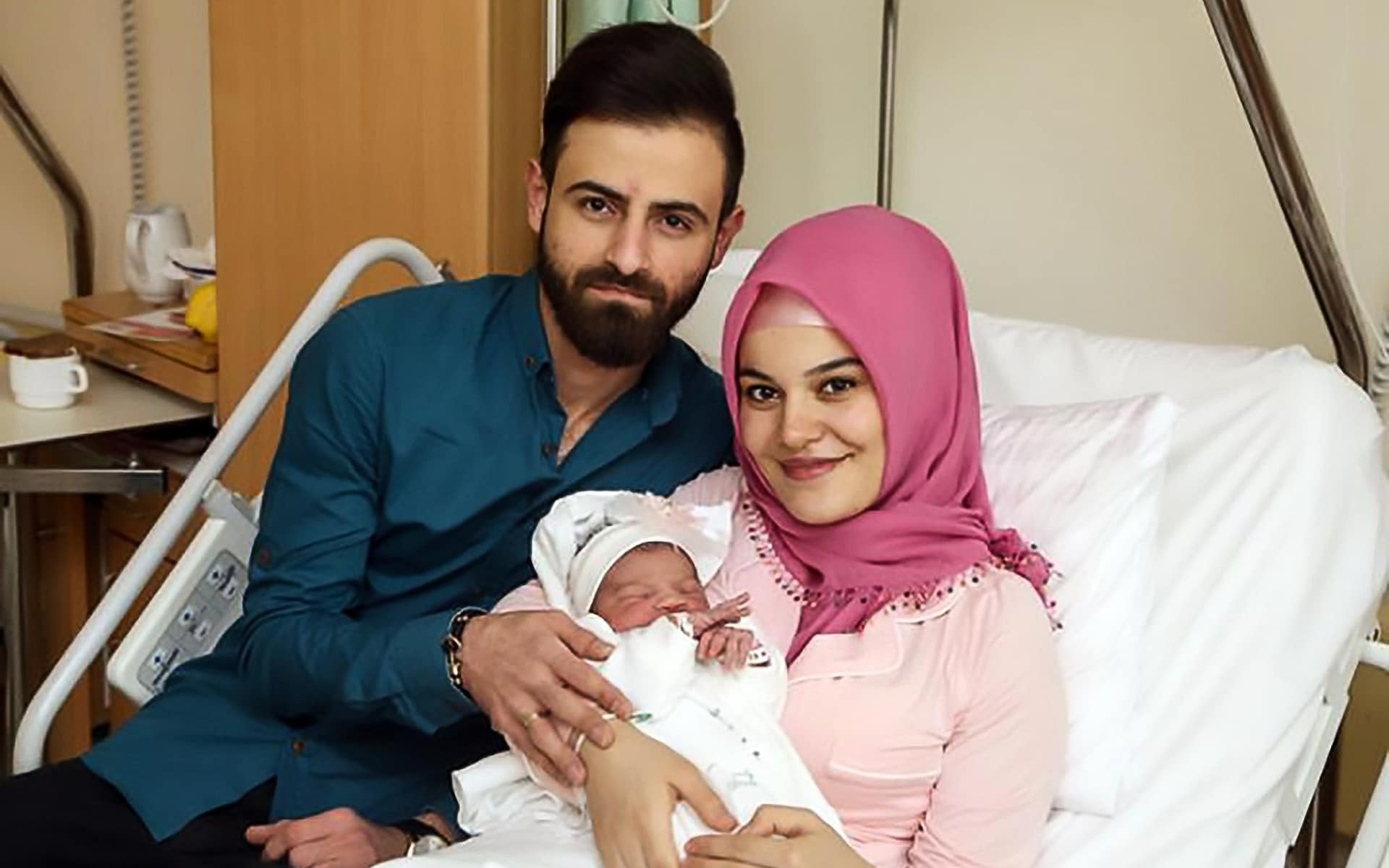 New Year's baby Asel and her parents; Vile racists have flooded the internet with hate speech directed at the official New Year's baby born in Vienna. Photo Credit: CEN/KAV/Votava
New Year's baby Asel and her parents; Vile racists have flooded the internet with hate speech directed at the official New Year's baby born in Vienna. Photo Credit: CEN/KAV/Votava
“Welcome, Dear Asel!”, Mr Van der Bellen said in a Facebook post, before reminding those who left racist messages that “all men are born free and equal in dignity and rights”, and speaking out against “hatred and agitation”.
Asel Tamga was named "the first Viennese baby" of the year and her photo appeared in many local media outlets, with her mother wearing a hijab head-covering.
However the newborn girl was greeted not with good wishes, but hundreds of extreme Islamophobic comments posted to the Facebook page celebrating the birth.
(The Telegraph)
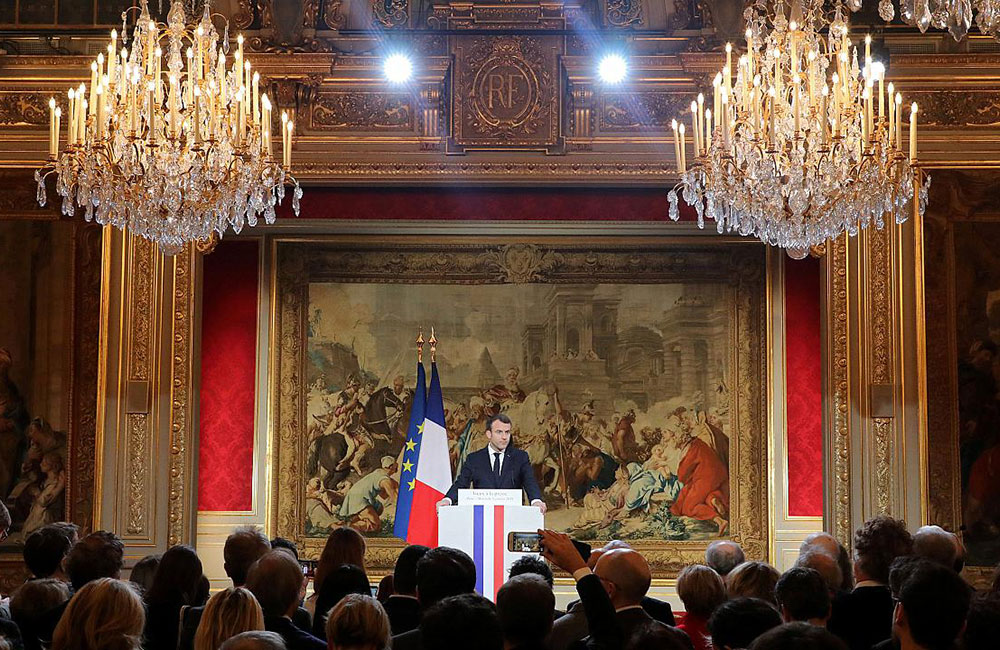
French President to introduce laws to tackle 'fake news'
France is set to fight back against the tide of so-called fake news with a law in 2018 aimed at protecting liberal democracy. Macron made the announcement during a New Year's address to the press corps at the Elysee Palace in Paris.
"I have decided that we will change our legal system to protect democratic life from this fake news," Macron said on Wednesday evening. "During the election period, on the internet, content will no longer have exactly the same rules," he said.
Law to target Social Media
The French president said the new law would be brought in before the end of the year. He wants the law to target social media and force online platforms to increase transparency sponsored content. It will allow content to be taken down and sites to be blocked if necessary.
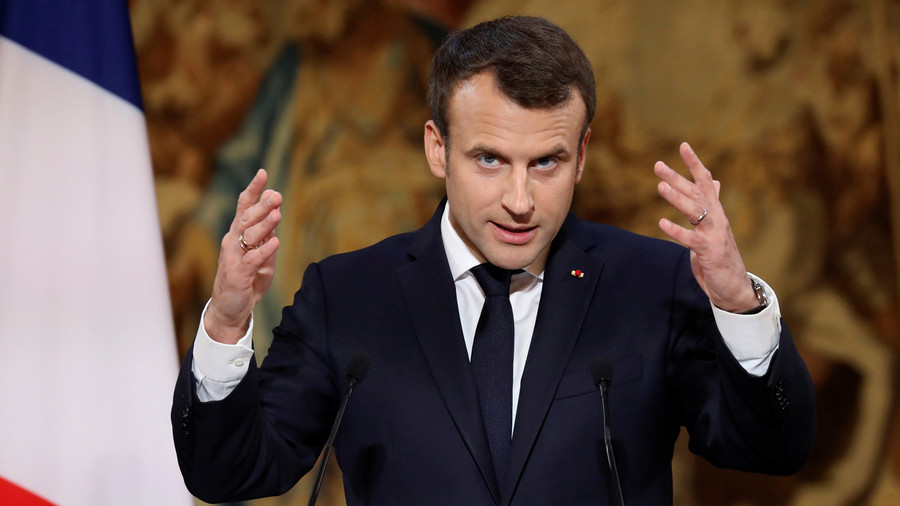
Macron vows to tighten media control because 'fake news threatens democracy' (Reuters).
“The freedom of the press is not a special freedom, it is the highest expression of freedom,” said Mr Macron. “If we want to protect liberal democracies, we have to be strong and have clear rules.”
The proposed legislation would allow for "content to be taken down, user accounts deleted and websites blocked if needed," he added.
So-called fake news, often spread by social media, has become an increasing problem in the political process, with elections in the UK, France and the US targeted by disinformation campaigns — for commercial or more overtly political reasons.
Macron has been highly critical of Russian media in particular, openly accusing TV channel RT of sowing disinformation about him via its website and social media during the 2017 French presidential election.

Record-Breaking US Astronaut And Moonwalker John Young Dies
Veteran U.S. astronaut John Young, who walked on the moon and even smuggled a corned beef sandwich into orbit during one of his six missions in space, has died at age 87, NASA said on Saturday.
Young, a former U.S. Navy test pilot, in 1972 became the ninth of 12 people ever to set foot on the moon.
"We're saddened by the loss of astronaut John Young," the National Aeronautics and Space Administration said in a statement on Twitter.
The time and cause of Young's death was not immediately clear.
Young became one of the most accomplished astronauts in the history of the U.S. space program. He flew into space twice during NASA's Gemini program in the mid-1960s, twice on the Apollo lunar missions and twice on space shuttles in the 1980s.
He retired in 2004 after 42 years with the U.S. space agency.
Source : NDTV
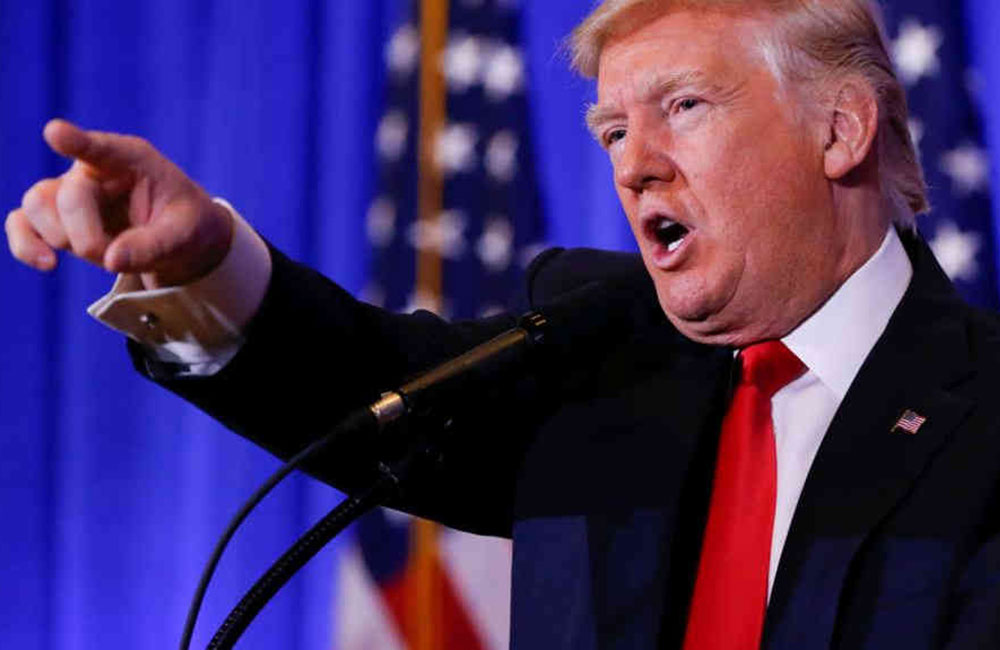
Trump attacks Pakistan with first tweet of 2018
US President Donald Trump has accused Pakistan of “lies and deceit,” saying the US was “foolish” to have given the country more than $33bn in aid.
The American President launched the scathing attack in his first tweet of 2018, claiming Pakistan “give safe haven to the terrorists we hunt” and think “of our leaders as fools”.
It follows reports the US is considering denying Islamabad $255 million in aid in a show of discontent with its efforts to fight terrorism.
The President made no further comment on the issue and it was not immediately clear if his tweet signaled a decision to cut off aid to Islamabad.
Relations between the US and Pakistan have soured since Mr Trump entered the White House.

Indian Politician sentenced to prison for fraud
Indian Rashtriya Janata Dal (RJD) party supremo Lalu Prasad was on Saturday sentenced to three and a half years jail in a fodder scam case.
Special CBI judge Shivpal Singh announced the sentence after hearing arguments on the quantum of sentencing.
He also slapped a Rs 5 lakh fine on the former Bihar Chief Minister.
The court had on December 23 convicted Lalu Prasad and 15 others in the case relating to the multi-million-rupee scam.
Former Chief Minister Jagannath Mishra, as well as six others, were acquitted in the case.
There are a total of six fodder scam cases against Lalu Prasad and this is the second case in which a verdict was pronounced.
The case relates to fraudulent withdrawal of Rs 84.5 lakh from Deoghar district treasury.
On December 13, hearing in the case was completed in a special Central Bureau of Investigation (CBI) court of Ranchi.
In all, there were 34 accused in the case, out of whom 11 died during the course of the trial, while one turned CBI approver and admitted the crime.
After the conviction in December, the party had announced that it will challenge the verdict in the high court.
"The Rashtriya Janata Dal (RJD) will challenge the special CBI court order at the high court soon," senior party leader Jagdanand Singh, considered close to Lalu Prasad, told the media in Patna.
Jagdanand, who is a former state minister, termed the Central Bureau of Investigation (CBI) as "tota" (parrot) and robot, controlled by the Bharatiya Janata Party (BJP)-led central government.
Lalu was first convicted on September 30, 2013, and received a five-year jail term. This disqualified him from Parliament and barred him from standing in elections. He was granted bail by the Supreme Court later that year.
Source : The Newsminute
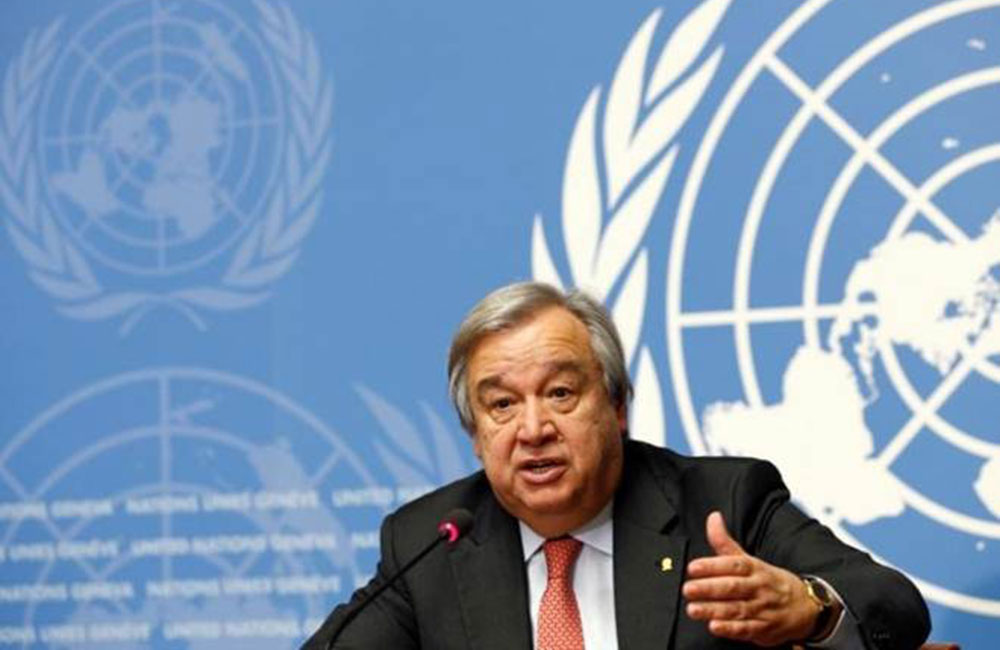
UN chief issues 'red alert' for 2018
In his message on the New Year, United Nations Secretary-General António Guterres is calling for unity among the global community to tackle overwhelming challenges and defend values shared by all.
“On New Year's Day 2018, I am not issuing an appeal. I am issuing an alert – a red alert for our world,” said the Secretary-General.
“As we begin 2018, I call for unity. […] We can settle conflicts, overcome hatred and defend shared values. But we can only do that together,” he expressed.
Recalling that last year he urged that 2017 be a year for peace, the UN chief noted that unfortunately – in fundamental ways, the world went in reverse.
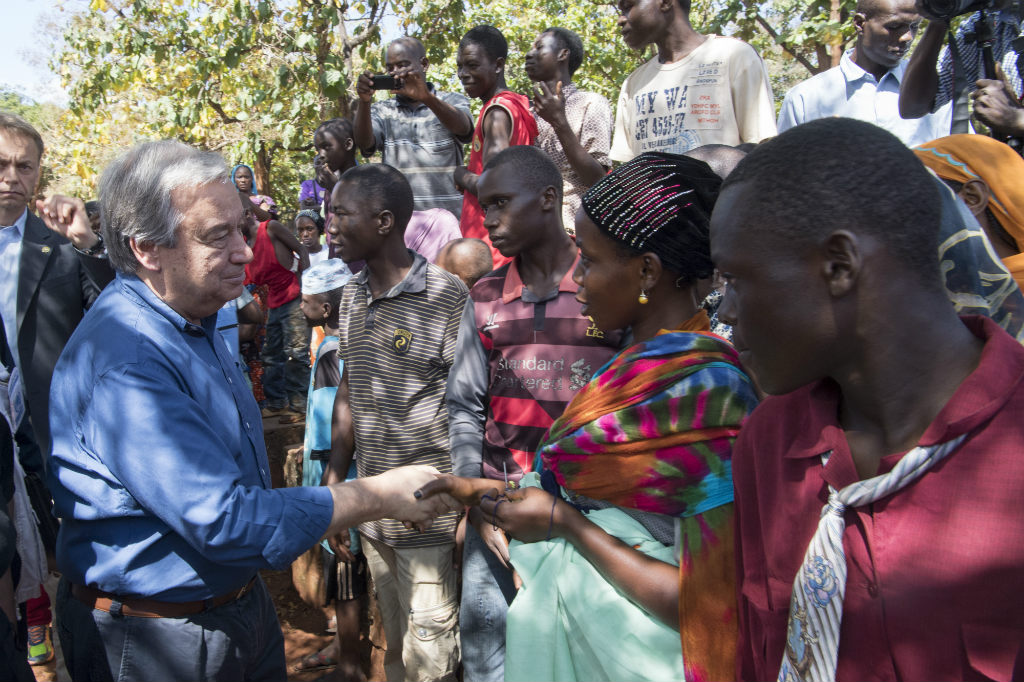
Secretary-General António Guterres (left) meets people living in a camp for internally displaced persons (IDPs) known as "Site du Petit Seminaire St. Pierre Claver", in the town of Bangassou. UN Photo/Eskinder Debebe
Perils, including deepening conflicts and new dangers emerged, and global concerns over nuclear weapons reached the highest since the Cold War, he added.
At the same time, impacts of climate change worsened at an alarming rate, inequalities grew and there were horrific violations of human rights.
“Nationalism and xenophobia are on the rise,” said Mr. Guterres.
Underscoring his belief that the world can be made more safe and secure, conflicts can be settled, hatred can be overcome and shared values defended, he emphasized that unity is indispensable to achieving these goals.
“Unity is the path. Our future depends on it,” said the Secretary-General, urging leaders everywhere to resolve in the New Year to: “Narrow the gaps. Bridge the divides. Rebuild trust by bringing people together around common goals.”
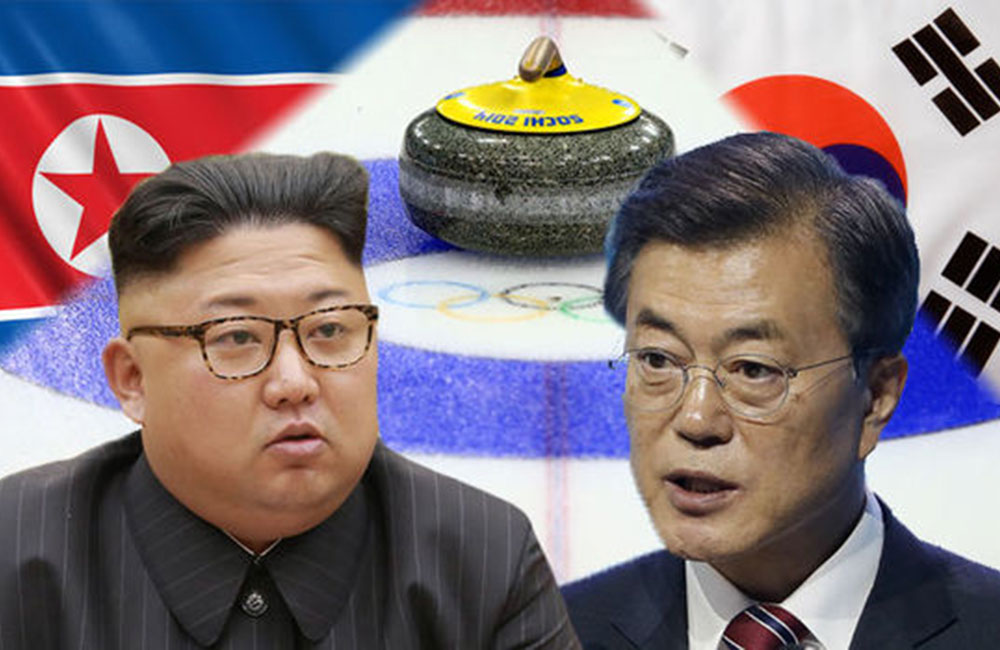
North Korea 'likely' to attend Olympics
A North Korean Olympic official has said that his country is "likely to participate" in next month's Winter Olympic Games, reports say.
Chang Ung, Pyongyang's representative to the International Olympic Committee, reportedly made the comment at Beijing International Airport on Saturday.
Chang is believed to be travelling to Switzerland to discuss the subject, Japanese news agency Kyodo reports. It comes a day after Pyongyang agreed to official talks with South Korea.
During his New Year's Day address, Kim said he hoped that the Pyeongchang Winter Games would be a success, adding that he was considering sending a delegation.
In response, South Korea's President Moon Jae-in proposed a meeting with North Korean officials to discuss the subject in detail.
Moon's proposal and Kim's remarks about the Olympics were the result of two secret meetings between South and North Korean sports officials, which took place in China in late December.
In those meetings, the two Koreas agreed to participate in sports exchanges during 2018.
Source : BBC News
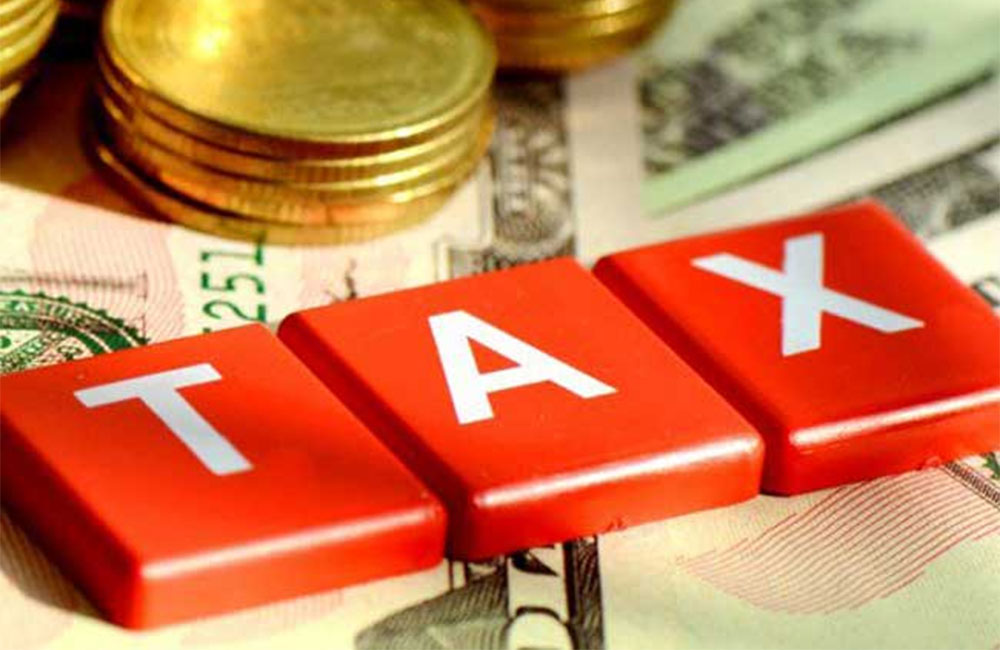
Saudi Arabia and the United Arab Emirates introduce VAT for the first time
Value Added Tax (VAT) has been introduced in Saudi Arabia and the United Arab Emirates for the first time.
The 5% levy is being applied to the majority of goods and services.
Gulf states have long attracted foreign workers with the promise of tax-free living.
But governments want to increase revenue in the face of lower oil prices.
The tax kicked in on 1 January in both countries.
The UAE estimates that in the first year, VAT income will be around 12 billion dirhams (£2.4bn; $3.3bn).
No plans for income tax
Petrol and diesel, food, clothes, utility bills and hotel rooms all now have VAT applied.
But some outgoings have been made exempt from the tax or given a zero-tax rating, including medical treatment, financial services and public transport.
Organisations such as the International Monetary Fund have long called for Gulf countries to diversify their sources of income away from oil reserves.
In Saudi Arabia, more than 90% of budget revenues come from the oil industry while in the UAE it is roughly 80%.
Both countries have already taken steps to boost government coffers.
In Saudi Arabia, this included a tax on tobacco and soft drinks as well as a cut in some subsidies offered to locals. In the UAE road tolls have been hiked and a tourism tax introduced.
But there are no plans to introduce income tax, where most residents pay 0% tax on their earnings.
The other members of the Gulf Cooperation Council - Bahrain, Kuwait, Oman, and Qatar - have also committed to introduce VAT, though some have delayed plans until at least 2019.
Source : BBC
Page 36 of 41
